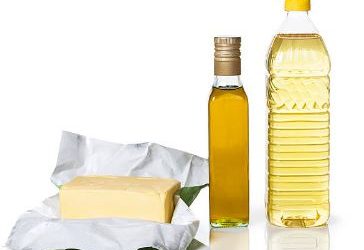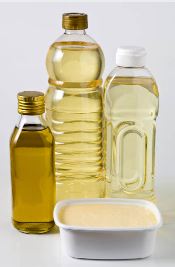
There is nothing more debated in the nutrition world than the topic of fats and oils. There is a wealth of opinion on the subject mainly due to a combination of food industry influence and the dynamic nature of research. This has resulted in a lot of confusion for people who want to know the healthiest oil or fat to use in their food and cooking. So, I am here to give you the lowdown on the latest studies and help you to navigate the subject.

Margarine, Vegetable Oils, and Seed Oils
Although the original formulation contained animal fat, margarine is now purely plant based. It was created back in 1869 in France in response to a challenge set by Emperor Napoleon III to create a butter substitute, which could feed the lower classes. Shortages of animal fat and butter during the Great Depression saw the formulation developed to contain vegetable oils and by the Second World War, further shortages drove animal-based margarine from the market. Vegetable spread sales and consumption were further increased in the 1950’s when Ancel Keys, a prominent researcher, postulated that saturated fat and cholesterol, such as that found in butter and dairy products were responsible for heart disease. Since then, margarines containing olive, sunflower, canola, and soybean oils have been developed, all aiming for the healthiest formulation.
Now the biggest problem with heart healthy claims on margarine and vegetable oils is that there is no convincing research, which shows that switching from butter to margarine cuts your risk of developing heart disease and studies have shown that it actually has the opposite effect 1. This is probably because they are highly processed and produced by mixing the oil with emulsifiers, colourings, and other ingredients, which are inflammatory when introduced into the body. Heart disease is an inflammatory disease and as such, these manufactured spreads and oils could contribute to its development and exacerbation. In addition, margarines and vegetable oils contain trans fats, which has a wealth of research showing that it contributes to poorer health outcomes and the development of heart disease and deaths as a result 2.

Butter and Saturated Fats
So, I hear you cry, it is obvious that butter is better! However, that isn’t exactly true either. Butter is a saturated fat, and the jury is still out on its role in the development of heart disease. Whilst some studies have shown little or no association with heart disease, others have shown that switching from saturated fat to polyunsaturated or monounsaturated fat alters blood lipids and reduces the risk for the development of heart disease 3,4. But the argument isn’t that straight forward as it has also been shown that reducing the total amount of saturated fat in the diet and replacing it with carbohydrates, especially refined carbohydrates, is also detrimental to heart health 5. The consensus appears to be that the inclusion of saturated fat in nutrient dense foods such as eggs and avocados is fine but avoid unnecessary sources such as butter.
Olive Oil

Avoiding butter and margarine raises the question of what is the alternative? Numerous studies published recently have shown a beneficial effect of the Mediterranean diet to heart health, which is largely attributed to the consumption of high amounts of extra virgin olive oil in this region. When minimally processed and simply extracted, it contains naturally occurring chemicals known as polyphenols that can interact with the expression of certain genes and functions in the body. These act to alter metabolism, lower blood pressure, reduce inflammation, and alter blood lipids, all of which reduce the risk for heart disease. In a major research study known as the PREDIMED study, extra virgin olive oil consumption was shown to cut heart disease risk by almost 40% and that every 10g/day increase reduced mortality risk by 10% in people at high risk of heart disease 6. As a result, eating between 20-30g/day is recommended for heart health 7.
There are numerous ways that you can incorporate olive oil into your diet. Instead of using butter on your vegetables, drizzle them with olive oil. In place of buttery toast, top with olive oil, rub with a garlic clove and add some chopped cherry tomatoes and fresh basil. Add it to tomato-based sauces to deepen the flavour. Buying minimally processed olive oil in dark glass bottles or cannisters will ensure that you are buying a high-quality product with large amounts of polyphenols. Store it away from heat and light and always ensure you tighten the lid after use to prevent it from degrading.
In summary, olive oil is a heart healthy alternative to butter, margarine, and highly processed vegetable oils. Wherever possible, ensure that you are including olive oil in your diet to lower your risk of developing this chronic disease.
1. Ramsden CE, Zamora D, Majchrzak-Hong S, et al. Re-evaluation of the traditional diet-heart hypothesis: Analysis of Recovered data from Minnesota Coronary Experiment (1968-73). BMJ. 2016;353. doi:10.1136/bmj.i1246
2. De Souza RJ, Mente A, Maroleanu A, et al. Intake of saturated and trans unsaturated fatty acids and risk of all cause mortality, cardiovascular disease, and type 2 diabetes: Systematic review and meta-analysis of observational studies. BMJ. 2015;351:1-16. doi:10.1136/bmj.h3978
3. Eyres L, Eyres MF, Chisholm A, Brown RC. Coconut oil consumption and cardiovascular risk factors in humans. Nutr Rev. 2016;74(4):267-280. doi:10.1093/nutrit/nuw002
4. Pimpin L, Wu JHY, Haskelberg H, Del Gobbo L, Mozaffarian D. Is butter back? A systematic review and meta-analysis of butter consumption and risk of cardiovascular disease, diabetes, and total mortality. PLoS One. 2016;11(6):1-18. doi:10.1371/journal.pone.0158118
5. Siri-Tarino PW, Sun Q, Hu FB, Krauss RM. Saturated fat, carbohydrate, and cardiovascular disease. Am J Clin Nutr. 2010;91(3):502-509. doi:10.3945/ajcn.2008.26285
6. Guasch-Ferré M, Hu FB, Martínez-González MA, et al. Olive oil intake and risk of cardiovascular disease and mortality in the PREDIMED Study. BMC Med. 2014;12(1):1-11. doi:10.1186/1741-7015-12-78
7. Donat-Vargas C, Sandoval-Insausti H, Peñalvo JL, et al. Olive oil consumption is associated with a lower risk of cardiovascular disease and stroke. Clin Nutr. 2022;41(1):122-130. doi:10.1016/j.clnu.2021.11.002
